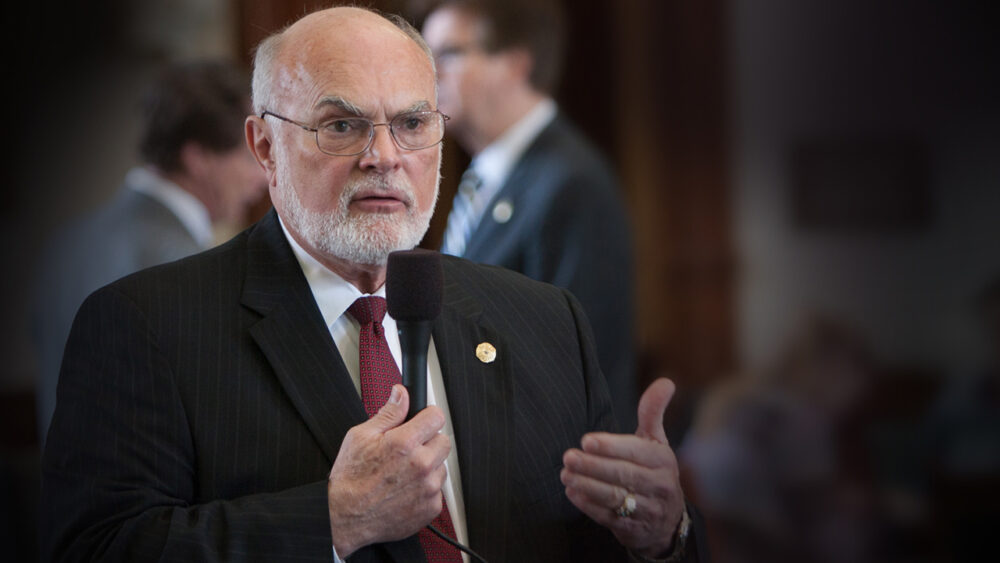State Sen. Robert Nichols — long viewed as the most liberal Republican in the Texas Senate — announced Monday that he will not seek re-election in 2026, following years of sharp criticism from conservative grassroots leaders who branded him a RINO for routinely voting against Republican priorities.
I feel truly blessed to have had the honor of representing the people of East and Southeast Texas. After 20 years in the Texas Legislature, I will not seek re-election and will conclude my service at the end of my term on January 12, 2027. https://t.co/7OXO5PI0cz
— Sen. Robert Nichols (@SenatorNichols) June 24, 2025
In a farewell statement, Nichols reflected on his 20-year tenure, saying, “It has been one of the greatest honors of my life to have represented the people of East Texas.” He added that he plans to finish his current term, which ends in January 2027.
But Nichols’ record tells a different story — one that conservatives say reflects a pattern of betrayal rather than honorable service.
As previously reported by The Dallas Express, Nichols has consistently ranked as the least conservative Republican in the Texas Senate, according to ideological ratings from Rice University’s Baker Institute — earning the bottom spot in the 2017, 2019, 2021, 2023, and 2025 sessions.
From School Choice to Gender Surgeries, Nichols Voted With Democrats
Nichols cast the deciding GOP vote to kill school choice in 2023, helping sink a proposal championed by Gov. Greg Abbott and Lt. Gov. Dan Patrick that would have established education savings accounts for Texas families. The measure had overwhelming support from GOP voters — more than 75% according to polling from TPPF and Defend Texas Liberty PAC — but Nichols stood with teachers unions and Democrats to oppose it.
He was also one of just two Republican senators who voted to allow gender modification procedures on minors, breaking with virtually the entire Republican caucus and sparking outrage from conservative parents and advocacy groups.
On immigration, Nichols backed National Guard deployment but refused to support legislation that would have allowed Texas law enforcement to directly detain and deport illegal immigrants, a key priority for conservative legislators seeking to bypass federal inaction.
Nichols Gutted Lobbying Ban, Empowered Bureaucrats
Perhaps most emblematic of Nichols’ tenure was his effort to gut Senate Bill 19, a GOP measure intended to ban taxpayer-funded lobbying — a practice by which cities, counties, and school districts use public funds to hire lobbyists who advocate against conservative reforms in Austin.
Nichols led the charge to weaken the bill, introducing an amendment that exempted powerful government associations like the Texas Association of School Boards (TASB) from the lobbying ban. His amendment passed 15–13, with every Democrat voting in favor alongside Nichols and a few moderates.
Sen. Mayes Middleton, who authored SB 19, told The Dallas Express at the time:
“For too long, taxpayers’ and parents’ own tax dollars have been used to lobby against them in Austin.”
In the wake of that vote, Nichols was publicly praised by TASB and the Texas Municipal League, two taxpayer-funded lobbying organizations that regularly oppose conservative legislation.
A Dallas Express survey of Republican primary voters confirmed what many already believed: Nichols had become the poster child for Austin’s GOP establishment — more interested in cocktail hours with lobbyists than delivering for his constituents.
Time to Move On
While Nichols claims he’s stepping down voluntarily, his retirement follows years of backlash from conservative activists, donors, and GOP primary voters increasingly fed up with his record.
As previously reported by The Dallas Express, Nichols was singled out in a survey of Republican voters as the top offender in the Texas Senate when it comes to siding with taxpayer-funded lobbying groups over constituents.
His repeated opposition to grassroots priorities — from school choice to government transparency — made him a top target for replacement heading into the 2026 cycle.
Now, with Nichols out of the race, Republican voters in East Texas will have a chance to elect a senator who reflects their values — not just the Austin establishment’s.


